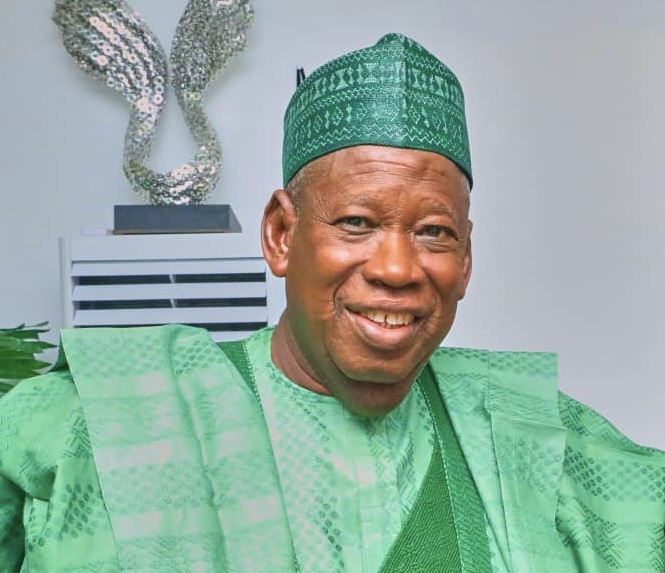When news broke that Abdullahi Umar Ganduje had stepped down as National Chairman of Nigeria’s ruling All Progressives Congress (APC), it didn’t just create ripples—it sent a political shockwave through Nigeria’s power corridors. This wasn’t just another resignation; it was a litmus test for political leadership accountability in one of Africa’s most dynamic democracies.
The resignation came amid a crescendo of legal battles, zoning controversies, public pressure, and intense intra-party wrangling. What made this moment significant wasn’t just Ganduje’s departure, but how it unfolded—and what it reveals about the evolving nature of leadership responsibility and governance stability in Nigeria.
In this article, we unpack what led to this development, how accountability mechanisms operated within APC, the implications for national governance, and what lessons the world can draw from this critical episode in Nigeria’s political story.
Background to Ganduje’s Rise
Abdullahi Umar Ganduje rose through Nigeria’s political ranks from deputy governor to two‑term governor of Kano State. After leaving office in 2023, he didn’t fade into the background. Instead, he was appointed APC’s National Chairman on August 3, 2023, amid internal power shifts within the party machinery ahead of key national reforms.
Ganduje’s tenure as chairman involved balancing party factions, managing regional interests, and preparing APC for the 2027 elections. However, his leadership came under increasing scrutiny due to legal disputes, ethical questions from his time in Kano, and growing dissent over regional zoning imbalances.
By early 2025, Ganduje was navigating not only typical party turbulence but a focused campaign within APC demanding his exit—especially from the North‑Central zone, which felt excluded from top leadership roles.
The Internal Crisis within APC
At the heart of the crisis was zoning—a cornerstone of Nigerian politics. North‑Central APC stakeholders openly demanded Ganduje’s removal and the chairmanship’s return to their region, citing APC’s own zoning arrangements.
This internal rebellion led to formal letters, state‑level protests, and looming legal threats. The Kano State APC ward controversially “suspended” Ganduje over alleged bribery, an action later overturned—but the damage was done.
Meanwhile, media scrutiny revived a 2018 video allegedly showing Ganduje accepting kickbacks. Though he denied its authenticity and faced no convictions, the stain remained. By mid‑2025, APC was visibly divided, with whispers of change growing louder. A leadership reset became not only likely, but essential.
The Final Push
The tipping point came in June 2025. President Bola Tinubu reportedly advised Ganduje to resign to preserve party unity ahead of 2027 elections. The move offered him a dignified exit—potential ambassadorial or federal appointment—while clearing leadership space.
On June 27, 2025, Ganduje submitted his resignation, citing health concerns. By evening, Deputy National Chairman (North), Ali Bukar Dalori, was named Acting National Chairman. Whether viewed as capitulation or strategic retreat, this was a decisive moment: APC had acted, and restructuring was underway.
Reason for Resignation
Ganduje’s resignation was underpinned by multiple rationales, each shedding light on emerging norms of accountability in Nigerian politics.
First was the presidential nudge: Tinubu, aiming to consolidate the party and minimize distractions, reportedly encouraged Ganduje to resign with a promise of a federal role.
Second, citing health concerns allowed Ganduje to exit gracefully without admitting governance failure, despite the lack of any public medical confirmation.
Third, internal pressure—from North‑Central dissidents to protests and zoning demands—had steadily mounted, making his leadership untenable.
Fourth, his exit served a strategic purpose: a unifying gesture that cleared the way for party restructuring and improved balance ahead of key elections.
Finally, the swift appointment of an acting chairman signaled orderly transition, not chaotic collapse.
Political Leadership Accountability
Political leadership accountability means public officials must explain and justify their actions and accept consequences when those actions harm public trust.
Ganduje’s case illustrates accountability through multiple channels: court challenges, internal party rule enforcement, media exposure of alleged misconduct, and public protests. None led to criminal charges, but accountability manifested politically—he stepped down to protect institutional integrity.
This demonstrates that accountability can be exercised through institutional pressure rather than formal legal punishment, reinforcing both leadership responsibility and party credibility.
Implications for Governance Stability
Ganduje’s exit has significant consequences for governance in Nigeria and within APC.
Firstly, it allowed for leadership recalibration. Acting Chairman Dalori’s presence provides continuity while adhering to democratic norms.
Secondly, it reaffirmed that internal accountability mechanisms hold sway—even over powerful figures—without external legal coercion.
Thirdly, it positions APC to present a united front ahead of 2027, though it carries the risk of renewed factional tension if not managed inclusively.
Overall, if handled well, the transition may restore trust. If mismanaged, internal fractures could resurface.
What’s Next?
APC must now elect a permanent National Chairman. Acting Chairman Dalori’s appointment needs NEC confirmation, and North‑Central stakeholders are insisting the role return to their zone.
Policy-wise, APC leadership may adopt reforms to reinforce zoning and transparency. Civil society and media will be vigilant, assessing whether the succession is meritocratic or nostalgic.
The way APC handles this will influence public perception and democratic maturity ahead of the next electoral cycle.
Broader Significance
Ganduje’s resignation transcends Nigeria’s borders—highlighting a global shift toward **institutional accountability** in governance.
Worldwide, political scandals—from Europe to Asia—often end in resignations fueled by media exposure and internal pressure. Spain’s series of corruption scandals underscores the need for deep structural mechanisms, not just high-profile exits.
Nigeria’s APC offers a model of “strategic accountability” that balances transparency, internal governance, rule enforcement, and continuity. It’s about correcting course without collapsing institutions.
The lesson is global: democracies strengthen when leadership transitions are grounded in process and principle—far beyond personality politics.
Final Insight
Abdullahi Umar Ganduje’s resignation represents a significant moment in Nigerian political history—not just for the storyline but for what it marks: that accountable leadership, fortified by institutional norms, can nurture stability—not fracture it.
As Nigeria moves toward the 2027 elections, APC must embed the lessons of this episode into its DNA. For democracies worldwide, this is a powerful illustration: real leadership means having the integrity to know when to stay—and when to bow out for the sake of the greater good.


